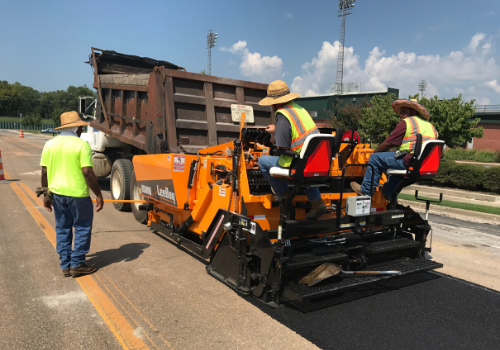Asphalt is a combination of aggregate (stone, gravel, and sand), additives, and bitumen (a sticky black byproduct of petroleum). The ingredients are mixed and heated at special asphalt processing plants.
Good-quality asphalt mixes are stiff and resistant to distortion, yet have sufficient flexural strength to prevent damage from varying pressures applied by vehicle wheels. Maintaining Asphalt Paving Charleston SC by regularly sealcoating and fixing alligator cracks prevents further deterioration.
Asphalt paving is used in a wide range of applications, from driveways for residential homes to major highways. Each type of road has unique requirements. The amount and weight of traffic and the weather are some of the biggest considerations. Heavy trucks, for example, require stronger pavement than cars and buses. The type of soil also plays a role in the strength of a road. For example, a sandy soil is more resistant to stress than a clay-based soil.
The subgrade, which is the layer beneath the aggregate and asphalt layers, is another important factor. The subgrade must be strong enough to support construction equipment during installation and then to distribute the load from vehicles throughout the life of the road. During an inspection, an asphalt contractor will use a DCP (Dynamic Cone Penetrometer) to measure the strength of the subgrade.
During the construction of an asphalt pavement, the subgrade is often reinforced with crushed stone to ensure that it can withstand the heavy load from cars and trucks. Once the subgrade is prepared, an asphalt paving company will determine how thick to make the aggregate base. The asphalt surface course, which is topped with the binder course, must be strong enough to withstand the shear stresses that occur between the base and the surface. This is a critical factor in reducing rutting, which can damage the road and lead to costly repairs.
Aggregate is the main load-supporting component of an asphalt pavement, and there are many different types of aggregates suitable for use in asphalt pavements, including sand, gravel, crushed rock, slag, or recycled concrete. The aggregates must be properly selected, graded, and processed to ensure that they are sized to fit in the paved area and provide proper drainage. The aggregates are mixed with an asphalt binder, or liquid asphalt, in a manufacturing plant that is capable of producing the specified mix formula. The plant includes cold bins for storage and controlled proportioning of the graded aggregate; dryers to heat the aggregate and asphalt to the required mixing temperature; a pug mill or drum for combining the aggregate, heated asphalt, and additives in accordance with the specified mix formula; and tanks to store the mixed liquid asphalt.
Durability
Asphalt paving is one of the most durable construction materials in existence. It is made from a combination of stone aggregates that are held together with binders, which act as glue to prevent the particles from moving or breaking apart under pressure. It also contains filler, which helps reduce cracking and improve permeability. Asphalt is used to build roads, driveways, parking lots, and more. It is very popular because of its durability and low cost.
However, a good-quality road requires more than just asphalt. It needs to be constructed correctly, and it must be maintained properly to ensure longevity and safety. Using poor-quality material or improper techniques can lead to the need for costly repairs sooner rather than later. This is why it is crucial to find a contractor who specializes in asphalt paving and uses the latest technology and high-quality control measures.
The durability of asphalt-paved surfaces is determined by the strength, stiffness, and fatigue resistance of the pavement. Its durability is improved by the use of a stiffer, modified binder in the mix and by proper design and construction. A good mix will have high shear strength and a low dynamic modulus. This will provide good load distribution and prevent rutting. It will also have sufficient stiffness to resist traffic loading and a low fatigue modulus to minimize pavement deformation under repeated stress.
A good mix will have adequate water stability properties, and it should pass the Marshall test and freeze-thaw shear splitting tests. It will also have good workability, which is a measure of its ability to be compacted under high shear and impact loads. It should also have a high temperature grade and a low viscosity, which will help it retain its shear strength at higher temperatures.
A number of additives are used in hot-mix asphalt (HMA) mixing to enhance its rheology and/or viscosity, increase its durability, and extend its service life. These additives include polymers, fibers, waxes, and other solids that modify the rheology on a molecular level. They can be added to the mixture at the time of mixing or at a later point in the paving process.
Weather Resistant
Asphalt is a versatile paving material that is used in roads, parking lots, and driveways. It offers a smooth ride and is durable and weather-resistant. It can also be recycled, making it a sustainable option.
Asphalt has great thermal properties and is flexible, which makes it better able to handle winter temperatures than concrete. It is less vulnerable to damage from de-icing salts as well. It is also better able to absorb the vibrations from heavy traffic, which makes it a safer choice for people walking or driving on it.
Like many paving materials, asphalt will expand and contract with temperature changes. It is important to discuss the expected load on your new pavement with your paving contractor to ensure that the surface is thick enough for your needs. The best time to execute your paving project is in the spring, before the harsh summer temperatures arrive. It is also recommended that any cracks, potholes, or other signs of wear and tear be repaired before the cold weather hits to avoid further damage and to keep your pavement safe for vehicles and pedestrians.
The type of asphalt you choose will depend on your climate and what types of vehicles are likely to use the road or driveway. Hot-mix asphalt (HMA) is the most common paving material used on roadways in the United States because it provides flexibility and durability. This is because the aggregate materials and binding material are heated to between 280 and 325 degrees Fahrenheit before they are laid down. The HMA cools quickly, which helps prevent damage to the road or driveway surface.
A newer form of asphalt, warm mix asphalt (WMA), is a compromise between the traditional HMA and cold mix asphalt (CMA). It is produced at lower temperatures and doesn’t cool as fast. This allows WMA to be hauled over longer distances and laid in cooler weather. It still provides good flexibility and durability for the road or driveway, but it is a safer option in colder climates.
Black asphalt has a high contrast with pavement markings, which helps drivers see them better. It also reduces noise pollution from cars and trucks, making it a popular choice in urban areas.
Recyclable
Asphalt can be recycled many times over, saving taxpayers and contractors money and creating new business opportunities. It also helps reduce energy costs, conserves scarce natural resources like aggregate and oil, and prevents the need to extract and transport virgin materials.
When an old driveway, road, or parking lot is removed and replaced with a fresh layer of asphalt, the chunks are transported to a recycling plant, where they are ground into a more finely crushed state known as RAP (Reclaimed Asphalt Pavement). This material is then mixed with new aggregate and melted bitumen in hot mix asphalt production to create a sustainable mixture that can be used on future projects throughout the city and across State.
The quality of the recycled mixture is determined by the maximum size of the aggregates and the gradation of the asphalt, a measure of how much of each particle is smaller than the largest sieve. It is important to select high-quality, clean aggregates that are free of foreign debris such as unsound cherts and oxides, organic matter, shale, and unsuitable sands. The mixture must also meet the minimum void content specifications for proper compaction and performance.
Recycled asphalt can be added to new mixtures in proportions up to 15 percent by volume. Peckham uses a combination of recycled and virgin materials in their HMA mixes for all of their construction projects throughout the five boroughs. This practice contributes to Mayor de Blasio’s goal of a more sustainable city while helping to keep hydrocarbons from being burned to create fresh new pavement.
The most significant advantage of using recycled asphalt is its low cost. The main ingredient in asphalt is crude oil, and its prices can fluctuate significantly. Reusing asphalt reduces the demand for new crude oil, lowering manufacturing costs and keeping the price of asphalt stable and affordable to local governments and homeowners alike. In addition to reducing the cost of asphalt, recycled materials are also better for the environment and are said to have more resistance to rutting and cracking than conventional asphalt mixes.
